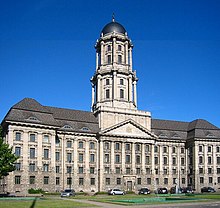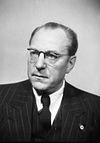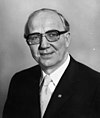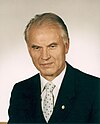Council of Ministers of the German Democratic Republic

The Council of Ministers of the GDR was the government of the GDR from November 1950 . According to the constitution of the German Democratic Republic, it was the highest executive body of the state and was formed exclusively by the SED and the parties united with it in the " Democratic Bloc ". In 1950 it consisted of 18 members, in 1989 it had 39 members.
construction
In the power structure of the GDR, the Council of Ministers was only a subordinate authority for approving resolutions and bills of the SED leadership. On the one hand, the GDR government, like the government of the Federal Republic, had only limited sovereignty in the early years . Particularly with regard to questions of external relations, the options for making decisions were very limited and the government of the GDR was directly subordinate to the Soviet Control Commission .
The real center of power in the GDR was the Politburo of the Central Committee of the SED with its secretariats. It controlled the party and the government. A resolution of the Secretariat of the Politburo of October 17, 1949 illustrates the role it played:
"Laws and ordinances of importance, materials of any other kind on which government resolutions are to be brought about, further proposals for the enactment of laws and ordinances must be submitted to the Politburo or the Politburo secretariat for a decision before they are passed by the People's Chamber and the government."
In addition, departments were formed in the Central Committee of the SED in June 1950 that corresponded to the departments of the ministries. These specialist departments in the Central Committee of the SED were the actual decision-making centers. The Council of Ministers was chaired by a chairman (Prime Minister). There were two 1st Vice-Chairs and nine additional Vice-Chairs . Together with some specialist ministers, they formed the Presidium of the Council of Ministers . The Presidium prepared all decisions in consultation with the responsible departments of the Central Committee (ZK) of the SED and the SED Politburo. The secretaries and department heads in the Central Committee of the SED were able to give instructions to the ministers.
First Deputy of the Prime Minister were to turn in 1989 Günther Kleiber and Alfred Neumann , both members of the Political Bureau of the Central Committee of the SED. Alfred Neumann was previously Chairman of the Economics Council under Ulbricht . Other deputy chairmen of the Council of Ministers were leading representatives of the four bloc parties .
The Council of Ministers also included the chairman of the State Planning Commission , the President of the State Bank of the GDR and a number of State Secretaries, most of whom were themselves heads of offices at the Council of Ministers. All members of the Council of Ministers - including the ministers - were elected by the People's Chamber for a five-year term. The Presidium was the working body between the weekly meetings of the Council of Ministers. These took place regularly on Wednesdays to implement the resolutions of the Politburo meeting at the Central Committee of the SED on Tuesday. In the centralized state structure of the GDR, the councils of the districts and the councils of the urban and rural districts were subordinate to the Council of Ministers as additional administrative levels.
The Law Gazette of the German Democratic Republic was also published by the Office of the Council of Ministers . Since 1983 the electronic “Central Cadre Data Storage” (ZKDS) of the GDR has been run by the Council of Ministers. In addition, the Council of Ministers had the press office, which issued official government announcements and was responsible for the accreditation of foreign journalists in the GDR. Its long-time director was Kurt Blecha .
From 1950 to 1953 the seat of the Council of Ministers was the former Prussian Landtag , from 1961 the former Old Town House in Berlin-Mitte at Klosterstrasse 47. The ministries had their own buildings in Berlin. In the House of Ministries on Leipziger Strasse near the Berlin Wall , the specialist ministries of the economic sectors were brought together.
Chairperson of the Council of Ministers or Prime Minister
The chairmen of the Council of Ministers or Prime Ministers were:
| No. | Name (life data) | image | Taking office | Term expires | Political party | |
|---|---|---|---|---|---|---|
| Prime Minister of the German Democratic Republic | ||||||
| 1 | Otto Grotewohl (1894–1964) |

|
October 7, 1949 | September 21, 1964 | SED | |
| Chairwoman of the Council of Ministers of the German Democratic Republic | ||||||
| 2 | Willi Stoph (1914–1999) |

|
September 24, 1964 | 3rd October 1973 | SED | |
| 3 | Horst Sindermann (1915–1990) |

|
3rd October 1973 | November 1, 1976 | SED | |
| 4th | Willi Stoph (1914–1999) |

|
November 1, 1976 | November 7, 1989 | SED | |
| 5 | Hans Modrow (* 1928 ) |

|
November 13, 1989 | April 11, 1990 | SED / PDS | |
| Prime Minister of the German Democratic Republic | ||||||
| 6th | Lothar de Maizière (* 1940 ) |

|
April 12, 1990 | October 2, 1990 | CDU | |
Head of the Office of the Council of Ministers were:
- Anton Plenikowski (1956–1963)
- Rudolf Rost (1963–1975)
- Kurt Kleinert (1974-1989)
Deputy Chairman of the Council of Ministers
- First deputy chairman (all SED):
- Walter Ulbricht (1955–1960)
- Willi Stoph (1962–1964)
- Alfred Neumann (1968–1989)
- Horst Sindermann (1971–1973)
- Günter Mittag (1973–1976)
- Werner Krolikowski (1976–1988)
- Günther Kleiber (1988 [?] - 1989)
- Deputy Chairman:
- Alexander Abusch (SED, 1961–1971)
- Erich Apel (SED, 1963–1965)
- Julius Balkow (SED, 1965–1967)
- Lothar Bolz ( NDPD , 1950–1967)
- Kurt Fichtner (SED, 1967–1974)
- Manfred Flegel (NDPD, 1967–1989)
- Hans-Joachim Heusinger ( LDPD , 1972–1989)
- Hermann Kastner (LDPD, 1949–1950)
- Günther Kleiber (SED, 1971–1988)
- Bruno Leuschner (SED, 1955–1965)
- Hans Loch (LDPD, 1950–1960)
- Alfred Neumann (SED, 1965–1971)
- Otto Nuschke ( CDU , 1949–1957)
- Fred Oelßner (SED, 1955–1958)
- Heinrich Rau (SED, 1950–1961)
- Wolfgang Rauchfuß (SED, 1965–1989)
- Hans Reichelt ( DBD , 1972–1989)
- Paul Scholz (DBD, 1952–1967)
- Gerhard Schürer (SED, 1967–1989)
- Rudolph Schulze (CDU, 1971–1989)
- Max Sefrin (CDU, 1958–1971)
- Fritz Selbmann (SED, 1956–1958)
- Horst Sölle (SED, 1986–1989)
- Willi Stoph (SED, 1954–1958)
- Max Suhrbier (LDPD, 1960–1965)
- Werner Title (DBD, 1967–1971)
- Walter Ulbricht (SED, 1949–1955)
- Gerhard Weiss (SED, 1965–1986)
- Herbert Weiz (SED, 1967–1989)
- Margarete Wittkowski (SED, 1961–1967)
- Kurt Wishes (LDPD, 1965–1972)
Ministries
The ministries and ministers were:
Usual ministries
The ministries of the armed organs
| Ministry name | Minister (party) | Reign | cabinet |
|---|---|---|---|
|
Ministry of the Interior (MdI) (see People's Police , combat groups ) |
Karl Steinhoff (SED) | 1949-1952 | |
| Willi Stoph (SED) | 1952-1955 | ||
| Karl Maron (SED) | 1955-1963 | ||
| Friedrich Dickel (SED) | 1969-1989 | ||
| Lothar Ahrendt (SED) | 1989-1990 | Modrow government | |
| Peter-Michael Diestel (DSU / CDU) | 1990 | Government de Maizière | |
|
Ministry of State Security since 1989 Office of National Security |
Wilhelm Zaisser (SED) | 1950-1953 | |
| Ernst Wollweber (SED) | 1953-1957 | ||
| Erich Mielke (SED) | 1957-1989 | ||
| Wolfgang Schwanitz (SED-PDS) | 1989-1990 | Modrow government | |
|
Ministry of National Defense from 1990: Ministry of Disarmament and Defense |
Willi Stoph (SED) | 1956-1961 | |
| Heinz Hoffmann (SED) | 1961-1985 | ||
| Heinz Keßler (SED) | 1985-1989 | ||
| Theodor Hoffmann (SED) | 1989-1990 | Modrow government | |
| Rainer Eppelmann | 1990 | Government de Maizière |
The Ministries of the Industries
In addition to the departments customary in every government, the Council of Ministers was shaped by a large number of industrial ministries that were established from 1950. The State Planning Commission was a central organ of the Council of Ministers ("Plan Carrier 1st Level") to coordinate the work of the individual industrial ministries ("Plan Carrier 2nd Level"). In 1958, the ministries of industry were dissolved and in 1961 merged in the newly founded National Economic Council (VWR). The chairman of the VWR was Alfred Neumann (SED). These organizational changes took place in the course of the introduction of the New Economic System of Planning and Management (NÖSPL). The VWR was abolished in 1965 and individual industry ministries were set up again. As before, these were subject to the State Planning Commission.
| Ministry name | Minister (party) | Reign |
|---|---|---|
| Ore mining, metallurgy and potash | Kurt Fichtner | 1966-1967 |
| Kurt Singhuber | 1967-1989 | |
| Electrical engineering and electronics | Otfried Steger | 1965-1982 |
| Felix Meier | 1982-1989 | |
| Coal and energy | Klaus Siebold | 1971-1979 |
| Wolfgang Mitzinger | 1979-1989 | |
| Chemical industry | Siegbert Löschau | 1965-1966 |
| Günther Wyschofsky | 1966-1989 | |
| Construction / construction | Lothar Bolz | 1949-1953 |
| Heinz Winkler | 1953-1958 | |
| Ernst Scholz | 1958-1963 | |
| Wolfgang Junker | 1963-1989 | |
| Gerhard Baumgärtel | 1989-1990 | |
| Axel Viehweger | 1990 | |
| Basic industry | ||
| Glass and ceramics industry | Werner Greiner-Petter | 1972-1983 |
| Karl Grünheid | 1983-1989 | |
| Materials management | Alfred Neumann | 1965-1968 |
| Manfred Flegel | 1971-1974 | |
| Wolfgang Rauchfuß | 1974-1989 | |
| Tool and processing machine construction | Rudi Georgi | 1973-1989 |
| General mechanical engineering, agricultural machinery and vehicle construction (since 1990: mechanical engineering) |
Günther Kleiber | 1973-1986 |
| Gerhard Tautenhahn | 1986-1989 | |
| Karl Grünheid | 1989-1990 | |
| Heavy machinery and plant engineering (since 1990: heavy industry) | Fritz Selbmann (SED) | |
| Rolf Kersten | 1981-1986 | |
| Hans-Joachim Lauck | 1986-1989 | |
| Kurt Singhuber | 1989-1990 | |
| Agriculture, forestry and food industry | Ernst Goldenbaum ( DBD ) | 1949-1950 |
| Paul Scholz (DBD) | 1950-1955 | |
| Hans Reichelt (DBD) | 1955-1963 | |
| Georg Ewald (SED) | 1963-1973 | |
| Heinz Kuhrig (SED) | 1973-1982 | |
| Bruno Lietz (SED) | 1982-1989 | |
| Hans Watzek (DBD) | 1989-1990 | |
| Peter Pollack | 1990 | |
| Light industry | Wilhelm Feldmann | 1950-1958 |
| Johann Wittik | 1965-1972 | |
| Karl Bettin | 1972-1988 | |
| Werner Buschmann | 1978-1989 | |
| Gunter Halm (NDPD) | 1989-1990 | |
| District-run industry and food industry | Erhard Krack | 1965-1974 |
| Udo-Dieter Wange | 1974-1989 | |
| Trade and supply | Karl Hamann | 1949-1952 |
| Curt Wach | 1953-1959 | |
| Curt-Heinz Merkel | 1959-1963 | |
| Gerhard Lucht | 1963-1965 | |
| Günter Sieber | 1965-1972 | |
| Gerhard Briksa | 1972-1989 | |
| Manfred Flegel | 1989-1990 | |
| Foreign trade | Georg Ulrich Handke | 1949-1952 |
| Kurt Gregor | 1952-1954 | |
| Heinrich Rau | 1955-1961 | |
| Julius Balkow | 1961-1965 | |
| Horst Sölle | 1965-1986 | |
| Gerhard Beil | 1986-1990 | |
| geology | Manfred Bochmann | 1974-1989 |
Commissions equivalent to ministries
| Name of the position in the Council of Ministers | Minister (party) | Reign | cabinet |
|---|---|---|---|
| State Planning Commission | Heinrich Rau ( SED ) | 1950-1952 | |
| Bruno Leuschner (SED) | 1952-1961 | ||
| Karl Mewis (SED) | 1961-1963 | ||
| Erich Apel (SED) | 1963-1965 | ||
| Gerhard Schürer (SED) | 1965-1989 | ||
| Minister and Chairman of the Workers 'and Peasants' Inspection Committee |
Fritz Lange | 1948-1958 | |
| Ernst Wabra | 1958-1961 | ||
| Hans Jendretzky | 1961-1963 | ||
| Heinz Matthes | 1953-1977 | ||
| Albert Stief | 1977-1989 | ||
| Head of the press office | Kurt Blecha | 1959-1989 | |
| Wolfgang Meyer | 1989-1990 | Modrow cabinet |
Other government agencies of the Council of Ministers
In addition, independent state secretariats and central offices were directly subordinate to the Council of Ministers, among others
- the State Secretariat for Labor and Wages: Hellmuth Geyer since 1965
- the State Secretariat for Church Affairs : Werner Eggerath , Hans Seigewasser , Klaus Gysi , Kurt Löffler
- the State Committee on Physical Culture and Sport
- the Office for Awards under State Secretary in the ministerial rank Walter Halbritter ,
- the State Central Administration for Statistics (SZS): Arno Donda since 1963
- the Office for Standardization, Metrology and Goods Testing (ASMW)
- the Office for Industrial Design (AiF): Martin Kelm since 1972
- the office for youth issues (including Johannes Keusch )
- the State Office for Nuclear Safety and Radiation Protection (SAAS)
In some cases their leaders acted as members of the Council of Ministers.
New ministries from 1989/1990
| Ministry name | minister | Political party | Reign | cabinet |
|---|---|---|---|---|
| Economy (from 1989) | Christa Luft | SED / PDS | 1989/1990 | Modrow cabinet |
| Gerhard Pohl | CDU | 1990 | Cabinet de Maizière | |
| Gunter Halm | BFD | 1990 provisional | Cabinet de Maizière | |
| Tourism (from 1989) | Bruno Benthien | LDPD | 1989/1990 | Modrow cabinet |
| Work and Wages (from 1989) / Labor and Social Affairs (from 1990) |
Hannelore Mensch | SED / PDS | 1989/1990 | Modrow cabinet |
| Regine Hildebrandt | SPD | from April 1990 | Cabinet de Maizière | |
| Jürgen Kleditzsch | CDU | provisional from August 1990 | Cabinet de Maizière | |
| Family and women (from March 1990) | Christa Schmidt | CDU | 1990 | Cabinet de Maizière |
| Church issues (from 1989) | Lothar de Maizière | CDU | until March 1990 | Modrow cabinet |
| education and Science | Hans Joachim Meyer | CDU | 1990 | Cabinet de Maizière |
See also
Web links
Files of the Council of Ministers in the Federal Archives .
Individual evidence
- ^ Andreas Malycha, Peter Jochen Winters The SED: History of a German Party; Beck, Munich, ISBN 3-406-59231-7 , pp. 67, 70, 205, 211.
- ^ Siegfried Suckut, Parties in the Soviet Zone / GDR 1945–1952. Federal Agency for Political Education, Bonn 2000. ISBN 3-89331-384-2 , p. 83.
- ^ Andreas Malycha, Peter Jochen Winters The SED: History of a German Party; Beck, Munich, ISBN 3-406-59231-7 , pp. 78,190. see also Dierk Hoffmann, Otto Grotewohl (1894–1964): A political biography. Publications on SBZ / GDR research in the Institute for Contemporary History, Oldenbourg, Munich, ISBN 3-486-59032-4 , p. 392.
- ↑ a b c at the same time general director of the Deutsche Reichsbahn
- ↑ before: German Central Administration for National Education
- ↑ a b History of the GDR authorities ( Memento of the original from March 4, 2016 in the Internet Archive ) Info: The archive link was inserted automatically and has not yet been checked. Please check the original and archive link according to the instructions and then remove this notice. . In: The Federal Archives . Article of April 13, 2010. Website of the Federal Archives. Retrieved October 11, 2011.
- ^ Helmut Müller-Enbergs : Bochmann, Manfred . In: Who was who in the GDR? 5th edition. Volume 1. Ch. Links, Berlin 2010, ISBN 978-3-86153-561-4 .

